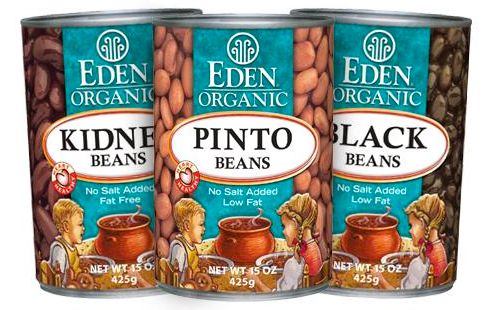 Eden Organic: A BPA-Free Option
Eden Organic: A BPA-Free Option
The slogan goes “Plastics make it possible.” and there is no question that the invention of plastics over the past century has greatly changed our lives in so many ways. But starting in the late ‘90s research began questioning the perfect world of plastics. As a result, consumers are looking for alternatives to plastics -- Bisphenol A (BPA) in particular.
BPA is a chemical that is used for polycarbonate plastics (the hard plastics used in baby bottles and water bottles) and epoxy resins (the stuff that coats the inside of most cans). What’s the danger? Based on animal studies, BPAs have been classified as an endocrine disruptor. What this means is that it can emulate hormones in the body and lead to serious health problems. When food and liquids are in contact with BPAs they leach into the food and are ingested.
Government scientists think that our greatest exposure to BPA is from foods, especially canned goods. In 1997, the FDA found that BPA leached form polycarbonate water vessels into water at room temperature and that concentrations of the BPA in the water increased over time. This should make you think twice about the office water cooler. BPA was detected in canned goods, nonstick-coated cookware, plastic wrap for food packaging, recycled food boxes and clothes treated with fire retardants (those pajamas we all buy that don’t say “Not intended for sleepwear”).
In April of 2008, Canada became the first country to ban the chemical from use in baby bottles. Since then there has been pressure for the US to act as well. What has ensued is a series of reports supporting and dismissing worrisome claims.
In January 2010 the FDA finally made a statement that there is reason for concern about the potential effects of BPA. Here's an excerpt:
"At this interim stage, FDA shares the perspective of the National Toxicology Program that recent studies provide reason for some concern about the potential effects of BPA on the brain, behavior, and prostate gland of fetuses, infants and children... FDA is supporting reasonable steps to reduce human exposure to BPA, including actions by industry and recommendations to consumers on food preparation. At this time, FDA is not recommending that families change the use of infant formula or foods, as the benefit of a stable source of good nutrition outweighs the potential risk of BPA exposure."
I don’t know about you, but I don’t need to wait for the results of scientific government-approved “further studies." It makes sense to reduce exposure as much as possible starting now.
Plastics by the numbers
The easiest way to navigate your plastic is by looking at the recycling numbers on the bottom of the container. The plastics with BPAs are labeled #7 but so are bio plastics made from plants. Newer Nalgene bottles will be marked, #7 BPA Free, for clarity. Check your numbers carefully and know your plastic. Avoid #3, #6, and #7 if not labeled BPA free or bioplastic.
Beyond Plastic
Initially the BPA buzz was only about plastic bottles, but there even more concern now about cans, so stock your pantry with jars of tomatoes instead of canned tomatoes and dried, not canned, beans. It may take a little more planning but it does not take more effort to soak some beans. Make your own soups in a blender in large batches and freeze some in a glass containers for when you really need to grab something quick. Other canned goods to avoid include tuna and soda pop.
(It's important to point out that just because a canned food is organic doesn't mean it is sold in a BPA-free can. To be sure, call the producer's customer service number -- it's often printed on the can's label -- and ask.)
Now onto paper goods. You know the receipts that you sign, rip up, and stuff into your purse several times a day? It turns out, according to this Science News article, that they are coated with a powdered BPA. I know you're not licking your receipts, but if you go out to eat, waitstaff are alternately handing customers their food as wel as these BPA-coated slips of paper. In addition, BPA-coated papers can be recycled into other paper goods, and BPA doesn't just disappear. Be sure there's something between your pizza and that recycled box.
All in all, BPA goes way beyond just your plastic bottles. Your best bet is to use items labeled BPA free, ask a lot of questions, and keep your eyes peeled for government and other updates. It doesn't hurt to cut down on packaging, canned goods, and skip the receipt. There will be less waste and growing season is about to begin, so why not eat fresh?
In the meantime here are some BPA-free options available now:
Canned Goods
- Dr. McDougall’s bpa-free soups
- Eden Organic
- Bionaturae tomato paste
- Henry and Lisa's Natural Seafood
Containers and Water Bottles
- Kleen Kanteen
- Sigg (only the new pale yellow coating)
- Ziploc Plastic containers
- Most baby bottles and sippy cups (look
for the BPA-free labels)

Leah Klein, a resident of Cambridge, Massachusetts, is originally from Canadian Mennonite territory in Ontario. With weekly Saturday morning visits to the Mennonite farmers market, she had early access to artisanal cheese, home-made summer sausages, and hearty German-style bread. She's also lived in France, England, Montreal and New York, each place, she says, adding to her culinary experiences. She enjoys cooking and spending the growing season with her family working and "sampling" at their organic CSA.



